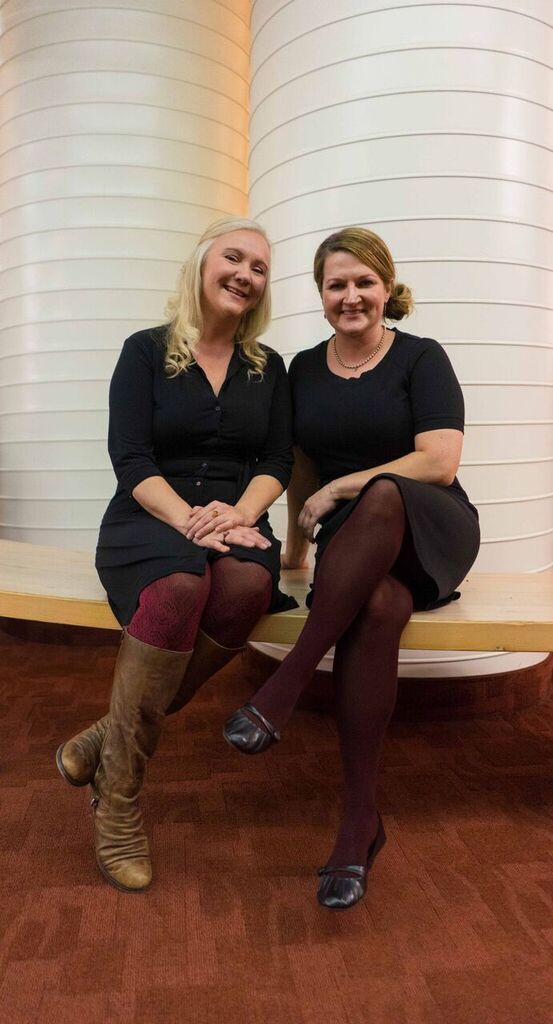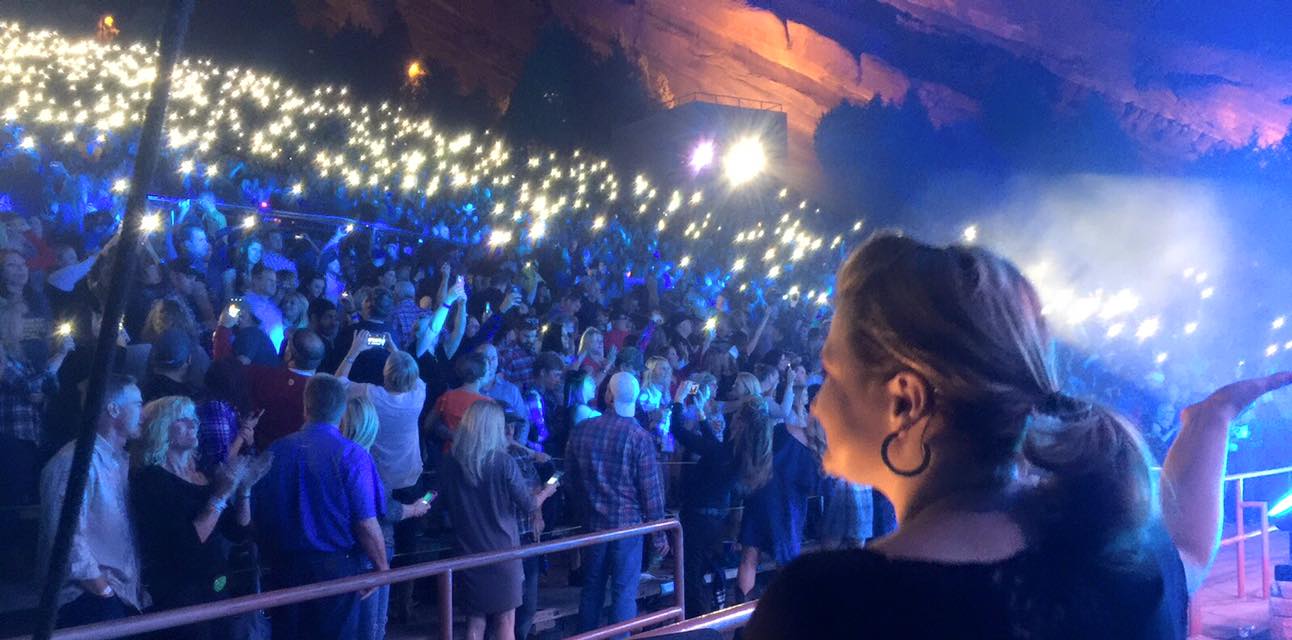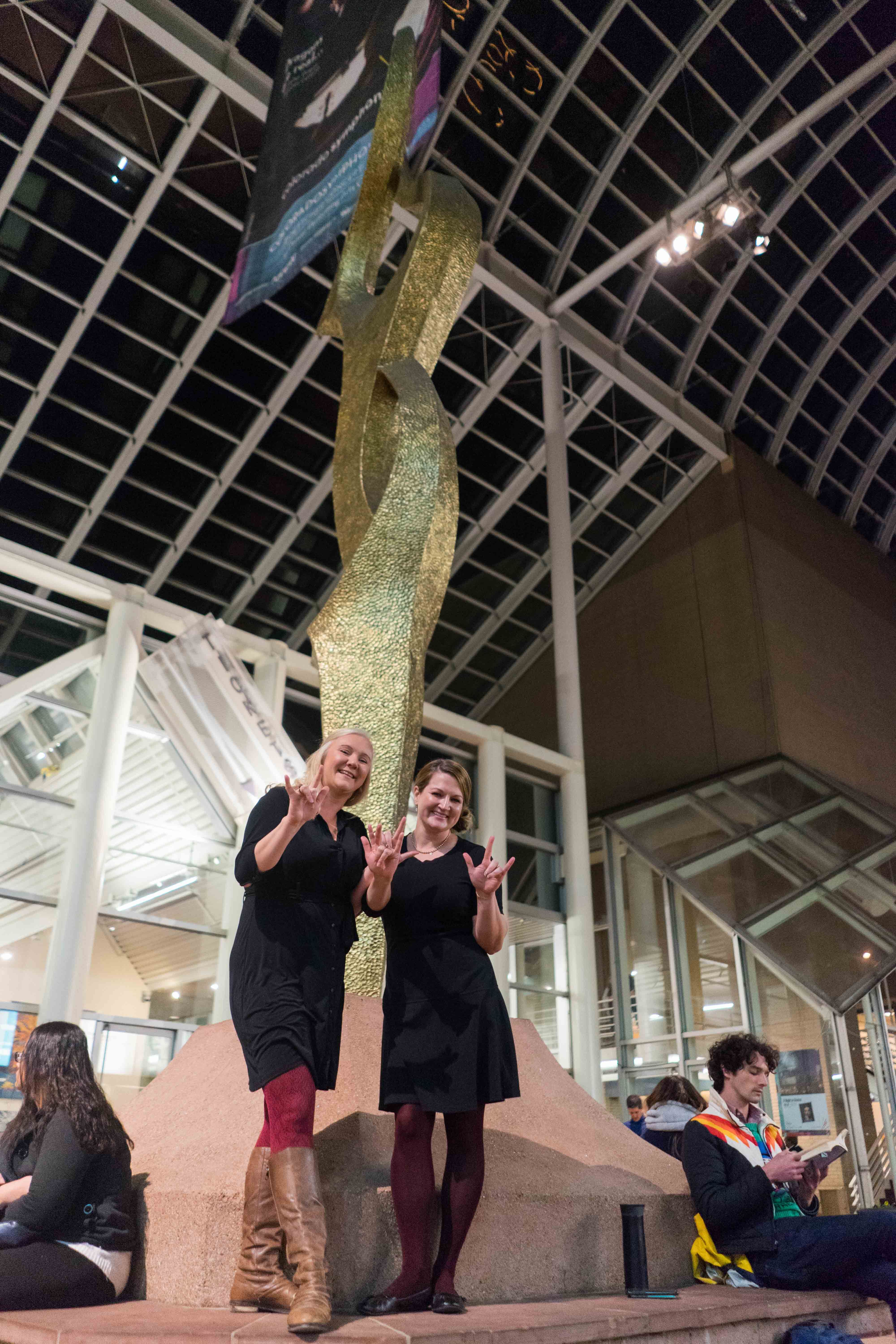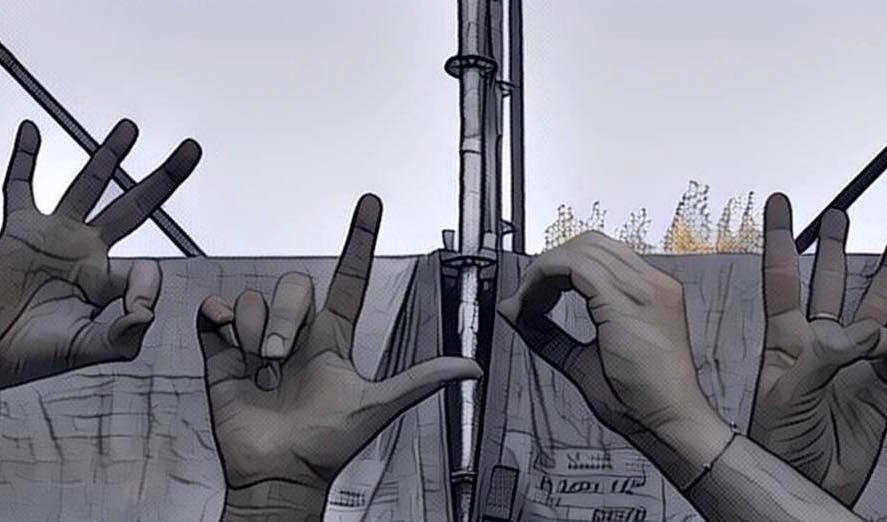Amber Whelan and Natalie Austin have had a vision for quite some time – make music accessible to the Deaf Community. In June of this year, and after more than a year of planning, Whelan helped make that dream possible by founding FLOW. FLOW is a performance sign language interpreting agency that strives to bring American Sign Language (ASL) Interpreting to the arts. They’ve performed with major artists from Adele to Stevie Wonder, Bob Dylan and many more . But perhaps their most profound ambition is to bring live interpreting to all musical performances — an infinite passion both Whelan and Austin share.
Music is a full body experience that is far more than auditory. What many people may not realize is the Deaf Community still feels the depths of a live performance. They must rely not only on articulation by hands, but also a soul and a purpose behind the one signing. Both ladies have degrees and national certification in ASL interpreting. Whelan has a Bachelor’s degree and Austin has Bachelor’s and Master’s degrees and is working on her PhD in the area of Deaf Education. They have dedicated their professions to providing access to the Deaf Community so they can feel and further experience music and the arts. Natalie is originally from Holyoke, Colorado, and Amber is from Omaha, Nebraska. FLOW is based in Colorado’s Front Range.

303 Magazine: How did you learn to sign?
Natalie Austin: I have a progressive hearing loss myself and am completely deaf in my left ear and wear an implant. When I was 13 I lost a significant amount of hearing and the doctors recommended that I start teaching myself sign language just in case I lost the rest of my hearing. I just got a dictionary and taught myself that way. Then, I went to school for Deaf Education and got my Bachelor’s in Deaf Education and my Master’s in Early Intervention in Deaf Education (working with babies who are deaf and with their families). When I lived in Africa, I lived at a school for the Deaf and that was the first time I was immersed and signed every single day. Then I moved back and went to interpreting school.
“You’re conveying every emotion that you’re seeing on stage. Everything you’re hearing has to be conveyed.”
Amber Whelan: I grew up with a deaf friend. We went to school together, and I watched her interpreter. She started teaching me since I was probably about six or seven. I’ve been signing professionally since 2008.
303: How did you get into signing for live music?
AW: I go to shows all the time. There are agencies out there who have interpreters who will be looking down at the podium, looking at the words, not being involved at all with the show. As interpreters, you have to be involved. You’re conveying every emotion that you’re seeing on stage. Everything you’re hearing has to be conveyed. That’s where our forte is. It’s doing that. It’s performance interpreting. It’s not just your standard put your hands in the air with a stale face. That’s the big difference. When I started seeing that, I said this can change. We can go out there and do this. I met Natalie interpreting for other agencies and I think her and I had the same thought of mind where she uses her whole body for drums and air guitar. I might use my shoulders to show the bass. It’s important to do that.
NA: I have a colleague who is Deaf and it was around the time Rent the musical came out. I was signing one of the songs to him, and it was the first time he had ever understood the emotion and the feeling behind that song. That really triggered something in me that made me feel like I had something that I had to develop and give back to help make theater and concerts more accessible. For me, it’s about the access to the arts. Artistic expression is huge in everybody’s life and just because someone is deaf doesn’t mean they can’t connect. That’s what started it for me and changed my focus to this.
303: Tell me about your preparation. Do you learn about the band’s language, their lyrics or their music?
NA: You learn about them. Some of their songs are about them, about their children, an ex-wife, an ex-girlfriend, someone who passed away, and so you have to incorporate that into how you translate the lyrics to bring their meaning across as the artists. You have to learn the band members names because they’ll rattle them off, and you have to know who they’re talking about so you can give the names to the audience members.

AW: We’ll cram like we’re studying for a college test. We work our butts off trying to provide that.
303: Are you looking at anything during the show?
AW: Natalie has an iPad. I use my Nook. Sometimes you don’t have the lyrics at all, and that’s going with the flow. That’s why we study so much. We prefer a month.
303: How does somebody who has never heard sound before interpret and understand music?
AW: Some of our clients bring balloons, and they can actually feel the bass. They might not be there for the music, they might be there for that community feeling. They want to go out and be part of what’s going on. For the completely deaf, the important part is to show each instrument so they don’t get lost.
NA: Oftentimes, deaf and hard of hearing fans know the lyrics better than the hearing audience members because that’s what they have. That’s why it’s so imperative for us to have the actual lyrics that are being said. There’s a new piece of technology out called a Subpac, which one of our clients has. It is a wearable tactile audio system you can connect with the sound system for a concert and actually feel the beat. It’s sensational. We have another client who just loves to dance. Deaf people can still feel through the reverberations of the floors and feel the beat in the air and just connect with the energy that’s going on.

303: How did you come up with the name FLOW?
AW: It’s the energy you feel, it’s the reverb, it’s the give and take. It’s watching the musicians, the audience, the deaf clients who have a big smile on their face and it’s these moments, it’s when everything is working beautifully together – that’s the Flow.
NA: Also, “Go with the flow” is our tagline because as performance interpreters, that’s the attitude you have to have. Sometimes you’ll get a show request the day before, and you have to “go with the flow” and do it and learn lyrics in a day. Or you show up and there’s no setlist and totally different songs – “go with the flow.” No music stand, no lights – “go with the flow.” Oh, Adele is going over here, and now I’m going over here – “go with the flow.”
303: When Tool played at the Pepsi Center there were long moments without any lyrics, but yet you still engaged with the audience, which is what really took me aback. Are you constantly conveying some type of emotion or energy even when there are lyrical lulls?
AW: I think that’s part of our specialty. We definitely emphasize that. The motion never stops. The intense drums that [Danny] Carey was playing never stop until they do and Maynard kicks in – you’ve got to be ready for that and show the people where that [boom] is.
303: What’s next for FLOW?
AW: We’re working on open access for all venues to be sure that a Deaf fan can go to a show last minute and that there will be an interpreter there no matter if it us or another agency.
NA: Because we love music so much, that’s where our passion is rooted. Making it accessible for the Deaf Community is why we do what we do. Music is so huge in both of our lives that we want to make sure it’s accessible in everyone’s life.






I need to hire an interpreter who can sing. I am running for Ms Colorado and my talent is singing a song in sign language. I have a basic knowledge as my grandparents were deaf and my mother was an interpreter. I realize how special it is to sing. I need someone asap.
Try going to the FLOW interpreters Facebook page and messaging them there.